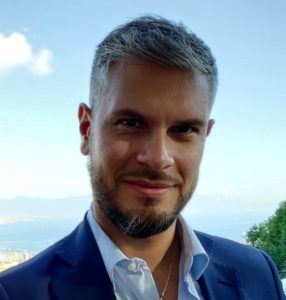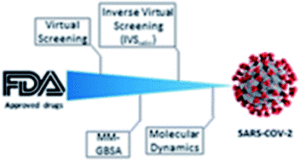We are very pleased to introduce Giuseppe Bifulco and Gianluigi Lauro, corresponding authors of the paper ‘Accelerating the repurposing of FDA-approved drugs against coronavirus disease-19 (COVID-19)‘. Their article has been very well received and handpicked by our reviewers and handling editors as one of our November HOT articles. Giuseppe and Gianluigi told us more about the work that went into this article and what they hope to achieve in the future. You can find out more about the authors and their article below and find more HOT articles in our online collection.
Meet the authors
 Giuseppe Bifulco was born in Naples, Italy, in 1968. In 1996, he obtained his PhD from the University of Naples (Organic Chemistry group of Prof. Minale). He worked as visiting scientist at the Scripps Research Institute (San Diego, CA) under the supervision of Prof. W. J. Chazin (1994–1995, 1996, and 1998) and Prof. K. C. Nicolaou (1995, 1996, 1998). From 1997 to 1999 he was a postdoctoral student at the University of Salerno in the group of Prof. Riccio; from 1999 to 2005 he was a Researcher at the University of Salerno, where he focused on the study of natural products, specifically on the structural characterization of the products by using homonuclear and heteronuclear one- and two-dimensional NMR techniques. From 2005 to 2017 he was Associate Professor at the University of Salerno. From 2017, he is Full Professor at the Department of Pharmacy of the University of Salerno. He is involved in different research fields, such as the structural characterization of biologically active natural organic compounds; advanced NMR techniques in organic chemistry; QM calculations for the assignment of the configuration of organic compounds; structural studies on drug–DNA interactions; drug design; development of novel molecular modeling approaches (Inverse Virtual Screening). These research activities have been supported by different research grants (funded by Fondazione AIRC per la Ricerca sul Cancro, Ministero dell’Istruzione dell’Università e della Ricerca, as Principal Investigator). He was awarded in 2004 with the Italian Chemical Society “G.Ciamician” medal, a national prize for researchers.
Giuseppe Bifulco was born in Naples, Italy, in 1968. In 1996, he obtained his PhD from the University of Naples (Organic Chemistry group of Prof. Minale). He worked as visiting scientist at the Scripps Research Institute (San Diego, CA) under the supervision of Prof. W. J. Chazin (1994–1995, 1996, and 1998) and Prof. K. C. Nicolaou (1995, 1996, 1998). From 1997 to 1999 he was a postdoctoral student at the University of Salerno in the group of Prof. Riccio; from 1999 to 2005 he was a Researcher at the University of Salerno, where he focused on the study of natural products, specifically on the structural characterization of the products by using homonuclear and heteronuclear one- and two-dimensional NMR techniques. From 2005 to 2017 he was Associate Professor at the University of Salerno. From 2017, he is Full Professor at the Department of Pharmacy of the University of Salerno. He is involved in different research fields, such as the structural characterization of biologically active natural organic compounds; advanced NMR techniques in organic chemistry; QM calculations for the assignment of the configuration of organic compounds; structural studies on drug–DNA interactions; drug design; development of novel molecular modeling approaches (Inverse Virtual Screening). These research activities have been supported by different research grants (funded by Fondazione AIRC per la Ricerca sul Cancro, Ministero dell’Istruzione dell’Università e della Ricerca, as Principal Investigator). He was awarded in 2004 with the Italian Chemical Society “G.Ciamician” medal, a national prize for researchers.
 Gianluigi Lauro graduated at the University of Naples “Federico II”, summa cum laude, in Medicinal Chemistry in 2009. In 2013, he obtained his PhD at the University of Salerno under the supervision of Prof. Giuseppe Bifulco. In 2012, he worked as visiting scientist at the Barcelona Biomedical Research Park under the supervision of Prof. Gianni De Fabritiis, and in 2017 at the Second Military Medical University, Shanghai, in the group of Prof. Wen Zhang. He is mainly involved in the development and implementation of the Inverse Virtual Screening computational approach, for the identification of the interacting targets of bioactive compounds, in the discovery of new anti-inflammatory/anticancer agents targeting different proteins (mPGES-1, BRD9), and in the stereostructural determination of organic compounds by quantum mechanical (QM) calculations. Currently, he is Researcher at the Department of Pharmacy of the University of Salerno and Principal Investigator of a research grant funded by Fondazione AIRC per la Ricerca sul Cancro (MFAG 2017).
Gianluigi Lauro graduated at the University of Naples “Federico II”, summa cum laude, in Medicinal Chemistry in 2009. In 2013, he obtained his PhD at the University of Salerno under the supervision of Prof. Giuseppe Bifulco. In 2012, he worked as visiting scientist at the Barcelona Biomedical Research Park under the supervision of Prof. Gianni De Fabritiis, and in 2017 at the Second Military Medical University, Shanghai, in the group of Prof. Wen Zhang. He is mainly involved in the development and implementation of the Inverse Virtual Screening computational approach, for the identification of the interacting targets of bioactive compounds, in the discovery of new anti-inflammatory/anticancer agents targeting different proteins (mPGES-1, BRD9), and in the stereostructural determination of organic compounds by quantum mechanical (QM) calculations. Currently, he is Researcher at the Department of Pharmacy of the University of Salerno and Principal Investigator of a research grant funded by Fondazione AIRC per la Ricerca sul Cancro (MFAG 2017).
Could you briefly explain the focus of your article to the non-specialist (in one or two sentences only) and why it is of current interest?
Our work was aimed to highlight whether already approved drugs (thus available on the market) could be used to fight the SARS-CoV-2 pandemic that has been plaguing the world in the past year. Italy was one of the countries most affected by the first outbreak this spring and we felt the responsibility, as scientist, to contribute to the research of possible cures.
How big an impact could your results potentially have?
We hope that our data can be used by other research groups as starting point to figure out new treatments for this disease. We are very confident about the results achieved and we will keep on working on the matter.
Could you explain the motivation behind this study?
The gravity and the extent of the pandemic was the main driving force that pushed us to pursue this study. As the disease spread all over the world the necessity for an immediate and effective treatment was a priority; therefore, we thought about testing drugs that already passed all the safety tests and could be used shortly after.
In your opinion, what are the key design considerations for your study?
In our opinion, the key design considerations for this study are: – find a new strategy for fighting SARS-CoV-2; – managing a huge amount of data; – sharing new findings with the scientific community; – contributing to the progress of scientific research.
Which part of the work towards this paper proved to be most challenging?
Time was definitely our worst enemy. From the technical point of view, managing the amount of data we collected was tricky, but we were rewarded by the good outcome of the study.
What aspect of your work are you most excited about at the moment?
Each data is a small piece of information added to the puzzle of SARS-CoV-2, we are eager to see whether our results will be the starting point for future developments. Scientifically, this pandemic is a precious opportunity for professional growth. Moreover, we will not stop researching new possible strategies to design and select new drug candidates.
What is the next step? What work is planned?
Our main field of research is inflammation and cancer, so we will surely continue on that path. This study, though, provided us a chance to explore new applications of the computational techniques to new purposes and we are enthusiast to work on this parallel.
Accelerating the repurposing of FDA-approved drugs against coronavirus disease-19 (COVID-19)
Simona De Vita, Maria Giovanna Chini, Gianluigi Lauro and Giuseppe Bifulco
RSC Adv., 2020,10, 40867-40875
DOI: 10.1039/D0RA09010G, Paper
 Submit to RSC Advances today! Check out our author guidelines for information on our article types or find out more about the advantages of publishing in a Royal Society of Chemistry journal.
Submit to RSC Advances today! Check out our author guidelines for information on our article types or find out more about the advantages of publishing in a Royal Society of Chemistry journal.
Keep up to date with our latest HOT articles, Reviews, Collections & more by following us on Twitter. You can also keep informed by signing up to our E-Alerts.











